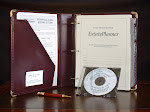Monday, April 02, 2012
Monday, March 26, 2012
Tuesday, March 20, 2012
Wednesday, March 14, 2012
Estate Tax Exclusion Scheduled to be Reduced on January 1, 2013. Currently, the federal estate tax exemption (the amount an individual can pass to his or her heirs free of estate tax) is $5,000,000. However, under current law, that exclusion amount is scheduled to reduce to $1,000,000 on Jan. 1, 2013. Will Congress act before January 1, 2013 to prevent the scheduled reversion? Although surveys show that most estate planners believe that the $5,000,000 exclusion will remain, it is really impossible to predict the final outcome (and exclusion). That's all the more reason to review and possibly amend our estate plans by the end of 2012. For larger estates worth $1,000,000 or more, it might be wise to implement a "disclaimer provision" amendment, which gives the greatest flexibility to a surviving spouse and still guards against an unexpected estate tax hit. For more information about this timely amendment, please contact us.
Monday, May 23, 2011
Wednesday, June 30, 2010
Thursday, September 24, 2009
If you are a Utah resident, you should complete the new (effective Jan. 1, 2008) Utah Advance Health Care Directive, which replaces both the old Health Care Power of Attorney and Living Will forms previously used. You can find the Directive and instructions for completing it (along with other useful information) at http://aging.utah.edu/utah_coa/directives/index.html. That site also has a very useful Toolkit which I recommend you read and complete before making any decisions. Be sure to print and sign two copies of the Directive; keep one at home and give the other to your family, doctor or attorney for safekeeping.
Utah residents can find information and register as an organ donor, by calling the Utah Donor Registry at 866-YES-UTAH or by visiting www.yesutah.org.
Non-Utah residents can find the legal requirements for their state by visiting www.donatelife.net/CommitToDonation/index.php.
Friday, September 04, 2009
Sunday, August 30, 2009
Here are some tips to effectively distribute valuables: 1) Talk to each family member privately to find out which items they would most value; 2) designate-in a dated and signed writing-which items should pass to each beneficiary; 3) be sure to specify (especially in the case of more valuable items) whether the gift counts as part of their share of the estate or is in addition to their share; 4) if two or more persons desire the same item (i.e., your piano, grandfather clock, etc.), consider specifying that the item will be distributed based on a family auction (i.e., the highest bidder receives the item and the auction proceeds are divided among all members, etc.); 5) if you leave personal effects to your spouse (and this is especially important in the case of "blended" marriages where each spouse has children from a prior marriage), specify whether your spouse should receive your items outright or merely to use until his or her death or remarriage (remainder to another). Most important (again, very important to do in a "blended" marriage): Be sure to identify which items in your household are yours or your spouse's, to better clarify who has the legal authority to dispose of them.
Wednesday, June 24, 2009
Wednesday, April 15, 2009
How can your trust assets be managed for you if you become incompetent? Your Successor Trustee (named in your trust) simply executes an Affidavit of Incapacitation acknowledging your incompetence, attaches a letter from your doctor verifying your incapacitation, and presents the Affidavit to each institution where you keep trust assets. Your Successor Trustee, then, can replace your name with his on your trust assets, becoming your trustee, and can manage your trust assets for you without a court hearing or court supervision. If you either don't have a General Durable Power of Attorney, or need it updated, please contact us at (801) 262-8889 or email us at emarel@comcast.net.
Wednesday, April 08, 2009
When a security freeze is in place at all three major credit bureaus, an identity thief cannot open a new account because the potential creditor or seller of services will not be able to check your credit file. When you want to apply for credit, you can lift the freeze temporarily using a PIN so legitimate applications for credit or services can be processed. For more information about Utah’s Credit Freeze Law, and how to “freeze” or “unfreeze” your credit information, see: http://www.consumersunion.org/pdf/security/securityUT.pdf
Saturday, April 04, 2009
The daughter asked, "Don't I get an additional share of the estate to compensate me for the loss of the duplex?" Her brothers were adamant: "No," replied one brother. "If Mother wanted you to receive a replacement asset she would have asked Mr. Loveridge to amend her trust to give you a larger portion." Legally, the property was considered adeemed, and the daughter lost her "bonus" duplex. The point? If you dispose of an asset intended for a specific beneficiary, be sure to consider whether to give that beneficiary another asset or a larger share to replace it.



